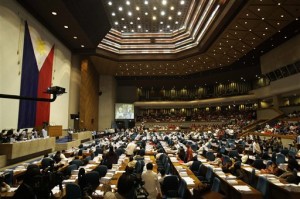House to open probe of judiciary funds
MANILA, Philippines–The House of Representatives will open an inquiry into the perceived failure of the Supreme Court to curb corruption in the judiciary, which a lawmaker claims goes “all the way to the top.”
The House committee on justice will call hearings on the issue next month.
Ilocos Norte Rep. Rodolfo Fariñas, the justice committee vice chair, said: “The Supreme Court has the power to discipline judges of lower courts, or order their dismissal by a vote of a majority of the members. Hence, it is answerable to the people through Congress if corruption in the judiciary pervades.”
Fariñas is the main sponsor of House Bill 4690, which would cut down the Supreme Court justices’ access to the “pork barrel-type” Judiciary Development Fund (JDF) by amending Presidential Decree 1949, which created it in 1984.
Iloilo Rep. Niel Tupas Jr., the justice committee chair, filed House Bill 4738 to abolish the JDF, which allegedly has been a source of corruption in the courts.
Both Fariñas and Tupas said that resuming the House JDF probe, which was suspended a year ago after one hearing, was timely because of the public uproar over the “justice for sale” disclosure of Sen. Antonio Trillanes IV.
Trillanes last week claimed that two Court of Appeals justices—Jose Reyes Jr. and Francis Acosta—were paid P50 million by the camp of Vice President Jejomar Binay to block the suspension of Makati Mayor Jejomar Erwin Binay Jr. with the payoff handled by a prominent lawyer, Pancho Villaraza of Villaraza & Angangco, or “The Firm.”
“The investigation of the alleged justice for sale is important to the main purpose of judicial reforms,” Tupas said, noting that the House probe would be parallel to the Senate inquiry into Trillanes’ allegations.
In an interview on radio on Sunday, Tupas said the justice committee would conduct an inquiry into the JDF and the alleged bribery in the Court of Appeals before the adjournment of Congress on June 15.
Tupas said there was no reason why Chief Justice Maria Lourdes Sereno and the other Supreme Court justices could not attend the hearings.
Last year, the justices said they could not attend the JDF hearings because they were deliberating on the motion for reconsideration of the government on the Supreme Court ruling against the Disbursement Acceleration Program.
Focus on reforms, but…
Tupas said that while the committee will focus on judicial reforms, specifically the abolition or castration of the JDF, the bribery allegations are likely to be tackled during the hearing.
He said Trillanes’ allegations were “very serious” and that the Supreme Court should immediately clear the air to prevent the public from further losing trust in the judiciary.
“Overall, we have received many complaints about the lack of integrity of our court officials, that is why we need these reforms. The problem, however, is that we don’t have proof because nobody wants to give evidence or testimony for fear of retaliation,” Tupas said.
“Most of the complaints we are getting are about bribery from the bottom all the way to the top,” he added.
Slow to act
Tupas questioned why the Supreme Court has been slow in going after scoundrels in the courts.
“The Supreme Court can initiate [on its own an investigation into] discipline. The problem is they are not aggressive [when it comes to the question of discipline in] their ranks,” he said.
Corruption in the judiciary, Tupas said, is “so prevalent that it starts from the very beginning before a case arrives in court to the trial to the penitentiary.”
